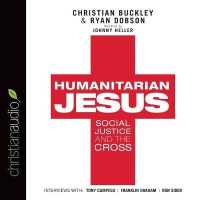- ホーム
- > 洋書
- > 英文書
- > Psychology
Full Description
This book shows educators how to develop assessments for designing pedagogies, courses, and curricula around student learning goals, including those identified by APA amp rsquo s Guidelines for the Undergraduate Psychology Major.
The contributors are veteran educators who offer expert advice for addressing assessment‑driven pressures from individual and institutional stakeholders. They also discuss international pressures as education programs around the world become more interconnected, which requires global cooperation and harmonization.
Using illustrative case examples, the authors provide strategies for assessing students amp rsquo learning, developing institutional assessment plans, and building bridges across institutions and international borders. In addition, they highlight the limitations of assessment, encouraging flexibility in determining what to assess and how to act on and communicate the resulting data. They encourage active, thoughtful engagement to improve student learning, and ensure that today amp rsquo s students are ready to compete in the global economy.
Contents
Contributors
Introduction: Assessment Assessment Everywhere-And What Are We to Think?
Susan A. Nolan, Christopher M. Hakala, and R. Eric Landrum
Part I. Institutional Approaches
Chapter . Scholarship of Teaching and Learning and Assessment: Advancing a Collaborative Model
Regan A. R. Gurung
Chapter 2. A Framework for Setting Educational Priorities
Melissa Beers
Chapter 3. The Sound and Fury of Academic Program Reviews: What They Reveal about Assessment and Accountability
Jane S. Halonen and Dana S. Dunn
Chapter 4. Replacing the Term Formative Assessment: A Modest Proposal
Rob McEntarffer
Chapter 5. How to Create a Culture of Assessment
Jason S. Todd and Elizabeth Yost Hammer
Chapter . Overcoming Obstacles That Stop Student Learning: The Bottleneck Model of Structural Reform
Claudia J. Stanny
Chapter 7. Backward Design, the Science of Learning, and the Assessment of Student Learning
Catherine E. Overson and Victor A. Benassi
Part II. Individual Approaches
Chapter 8. Assessment as a Pedagogical Science: A Stealthy Approach to Studying Effective Teaching
Bridgette Martin Hard
Chapter 9. Evidence-Based Teaching and Course Design: Using Data to Develop, Implement, and Refine University Courses
Danae L. Hudson
Chapter . A Taxonomy for Assessing Educational Change in Psychology
Raymond J. Shaw
Chapter . Using Formative Self-Assessment to Improve Teaching and Learning in Educational Psychology Courses
Eva Seifried and Birgit Spinath
Part III. International Approaches
Chapter 2. Assessing Learning Outcomes in Undergraduate Psychology Education: Lessons Learned From Five Countries
Jacquelyn Cranney, Julie A. Hulme, Julia Suleeman, Remo Job, and Dana S. Dunn
Chapter 3. Applying the Assessment Design Decisions Framework Internationally
Jacquelyn Cranney, Dana S. Dunn, and Suzanne C. Baker
Chapter 4. Measuring the Generic Skills of Higher Education Students and Graduates: Implementation of CLA+ International
Doris Zahner, Dirk Van Damme, Roger Benjamin, and Jonathan Lehrfeld
Chapter 5. Interdisciplinary Innovations in Formative and Summative Assessment: The Beliefs, Events, and Values Inventory VALUE Rubrics and the Cultural Controllability Scale
Kris Acheson, Ashley Finley, Louis Hickman, Lee Sternberger, and Craig Shealy
Afterword: What amp rsquo s Next?
Susan A. Nolan, Christopher M. Hakala, and R. Eric Landrum
Index
About the Editors








